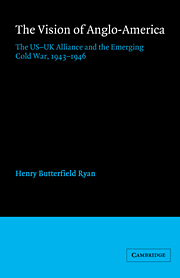Book contents
2 - Problems with American public opinion
from PART I - STRENGTHENING THE TIES: THE EFFORT AND THE PROBLEMS
Published online by Cambridge University Press: 07 December 2009
Summary
It was crucial to British plans for lasting military and diplomatic links with the United States that American opinion be favourable to Great Britain and its policies. As early as the first quarter of 1942, however, reports had reached Whitehall that Americans were critical of Great Britain's war effort. The British Embassy in Washington in its political review for that year feared the worst for the Anglo-American honeymoon of the immediate post Pearl Harbor era, which in its prime included a flying visit from Churchill to Washington even before 1941 was out. Indeed, within three months of that trip, strong criticism was being heard of British performance in the war, criticism that focussed on Britain's military reverses and the quality of its officers. Furthermore, the suspicion was aired that the British Government was hoarding forces in the UK to defend the home islands rather than sending them to the fighting fronts and that it was conducting its war effort mainly in the interests of the Empire. Moreover, following Japan's attack on American positions in the Pacific, not only did Asia become the focus of popular attention in America, obscuring the earlier image of Great Britain struggling valiantly and alone, but the United States began to feel its own power superiority. The British Embassy in Washington said that in early 1942 ‘even outside the Isolationist ranks the view gained powerful support that the war should be largely American led and American managed’.
- Type
- Chapter
- Information
- The Vision of Anglo-AmericaThe US-UK Alliance and the Emerging Cold War, 1943–1946, pp. 21 - 38Publisher: Cambridge University PressPrint publication year: 1987



